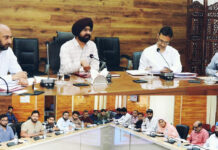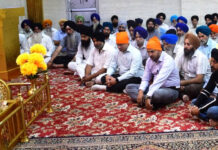
DOGRA HERALD BUREAU
kishtwar, Jan 10
In a significant development, the Waqf Board in Jammu and Kashmir has nominated Kishtwar Firdous Bhawani, a senior leader from the Bharatiya Janata Party (BJP), as the Executive Officer of Waqf in Kishtwar. This decision has been met with approval from party leaders, marking a collaborative effort between political and administrative entities.
The Waqf Act, initially passed by the Parliament in 1954, underwent subsequent amendments, with a noteworthy revision in 1995 that granted increased powers to Waqf Boards. The most recent amendment in 2013 endowed these boards with unparalleled authority to seize properties without the possibility of legal challenge, resulting in a wave of controversy and concerns regarding property rights.
A striking example of this legal framework’s impact was observed in March 2014, just ahead of Lok Sabha Elections, when the Congress facilitated the transfer of 123 prime properties in Delhi to the Delhi Waqf Board under the provisions of this law. This has led to the contentious seizure of thousands of acres of land belonging to Hindus across the country.
Adding to the complexity of the situation, the Tamil Nadu Waqf Board recently declared six villages, including a historically significant 1500-year-old Hindu Temple, as Waqf properties. This has raised questions about the extent of powers vested in Waqf Boards and their potential impact on cultural and religious heritage.
The roots of Waqf Board authority trace back to the aftermath of partition, where properties of Hindus in Pakistan were occupied by Muslims and the Pakistani government. As part of a reciprocal arrangement, the Indian government allocated the land of Muslims who migrated from India to Pakistan to the Waqf Boards. The Waqf Board Act, established in 1954, was subsequently amended in 1995 to grant unlimited rights to acquire land.
The latest data from the Waqf Management System of India reveals a staggering 8,54,509 properties under Waqf Boards, covering over eight lakh acres of land. Notably, after the Army and Railways, Waqf Boards hold the most extensive land holdings in the country. In just over a decade, the land under Waqf Boards has more than doubled, raising questions about the legitimacy of these acquisitions.
Critics argue that the Waqf Board’s expansion of land holdings often involves considering the land around cemetery boundary walls as its property. Additionally, concerns have been raised about the gradual declaration of illegal shrines and mosques as Waqf property, a practice colloquially referred to as encroachment.
The appointment of Kishtwar Firdous Bhawani as the Executive Officer of Waqf in Kishtwar adds a political dimension to this complex scenario.
As the political landscape interacts with administrative decisions, the implications for property rights, cultural heritage, and the broader socio-political fabric warrant close observation. The collaborative efforts between the Waqf Board and political leaders, as evidenced in this nomination, raise questions about the balance between religious authority, legal frameworks, and political influence in the context of land management.


























